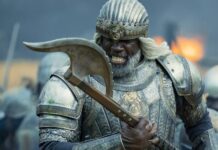My first reaction to this Jason Momoa article about his struggles even after playing the iconic Khal Drogo in Game of Thrones was frustration – because it came out just after we recorded our most recent episode of Show Your Work and it would have been such a perfect topic to discuss.
In an interview with InStyle he talks about how, contrary to what we’d assume, his ‘breakout’ role was actually a handicap. People saw him as a grunting lunkhead, even thinking he didn’t speak English, so he was being passed over for all kinds of roles that should have been almost a given for someone who, let’s be frank, looks and has the presence that Jason Momoa does.
What’s most compelling about this story, for me, is the ‘illusion factor’, if you will; this isn’t the usual struggling actor story we hear – hard to get noticed, or the cool project you did was shelved or barely seen. Game of Thrones had massive viewership from day one, and Drogo was a pivotal part of the first season, but the idea that the role that should have made you was actually a limitation is not only unusual, but has to be so incredibly isolating: your friends would kill for that role, or assume that because you’re on the biggest show going you’ve got it made, not to mention married to one of the world’s most unquestionably beautiful women. Meanwhile your reps are saying they can’t get anyone to call them back about someone who is known to virtually everyone with an internet connection.
We are just beginning to talk about ‘success’ and ‘failure’ in a way that reflects reality – i.e., neither is a permanent position, and across the board, but especially in creative careers, both are going to be very familiar positions over and over; there are people who have a big break and then never stop working, in increasingly high-profile and prestigious projects, but what if you’re not Tom Hanks?
It’s pretty easy to draw a line from that disappointing experience to the humility and gratitude that, by all accounts, defines Momoa…and there’s also an argument to be made that the struggles to be taken seriously (one of his major credits before GoT was Baywatch) allowed him to try out roles he wouldn’t have otherwise, including the Canadian series Frontier and two episodes of Drunk History which I am going to find immediately.
I know we know these lessons, about Instagram vs. reality, or comparing your insides to someone else’s outsides, but the glamour of seeing someone larger than life in one of our common obsessions still makes us assume they’re operating above the realm of ‘regular’ life problems or struggles. I think pieces like this help – though of course, the irony is that nobody wants to hear about Jason Momoa struggling until he’s very much not struggling anymore – but that idea of ‘actors aren’t real people’ contributes to everything from anonymous online scrutiny to entertainers being told they should ‘stick to acting’ and aren’t allowed to have opinions on politics or world events. And while on one hand I understand that ‘justice for celebrity struggles’ is low-low-low on anyone’s priority list, comparing yourself to people whose lives you assume you’ll never match really isn’t. So I’m honestly curious – how do we fix this? What’s the best way to stop comparing your life’s imperfections to the false front of the ‘success’, in whatever form, we all crave?




















![[Book Review] The Blade Itself (The First Law Trilogy) by Joe Abercrombie](https://bendthekneegot.com/wp-content/uploads/2018/01/1516047103_maxresdefault-218x150.jpg)
















